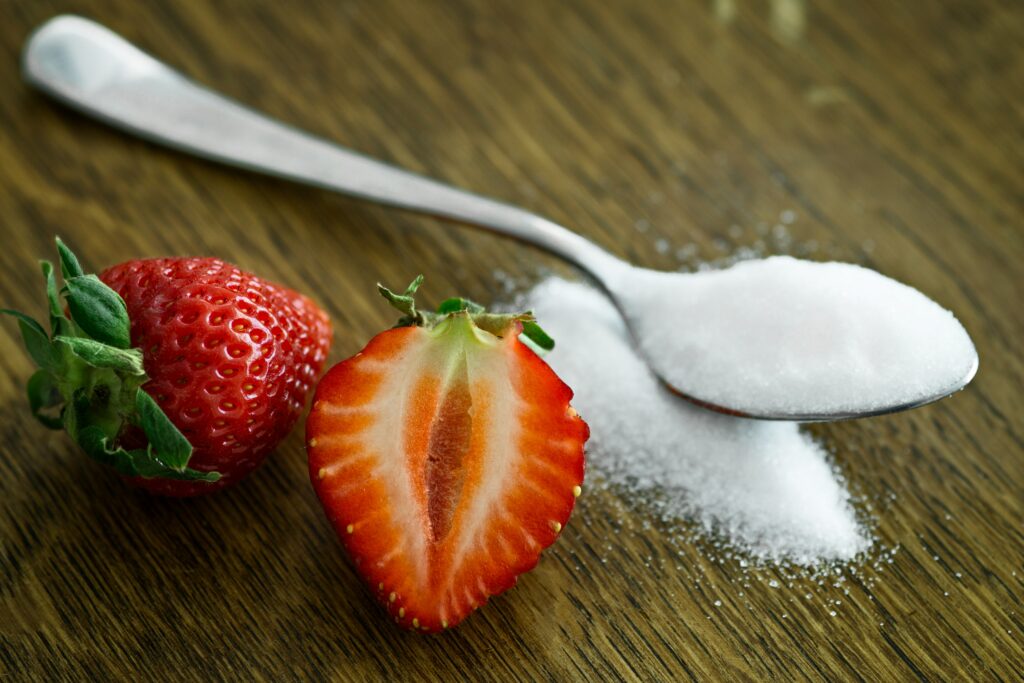
Is Sugar Bad for You?
First, we need to look at the types of sugar in our diet.
Sugar is a carbohydrate.
Carbohydrates are an essential nutrient whose main function is to supply the body, especially the brain, with energy. You can categorise carbohydrates into two main types, Simple carbohydrates are ‘Sugary Sugars’ and Complex Carbohydrates are Starchy Sugars.
Common sources of starchy carbohydrates are:
- bread
- breakfast cereals
- rice
- pasta
- potatoes
Common sources of sugary carbohydrates include:
- chocolate
- biscuits
- cake
- fruit
- some dairy produce
It is worth noting that naturally occurring sugars are found in whole fruit, vegetables and milk-based products and are not considered harmful to health.
A method of ranking carbohydrates is the Glycaemic Index. It is a method of classification which simply ranks foods based on how quickly the carbohydrate they contain is digested and absorbed into the bloodstream and their overall effect on blood glucose levels.
Foods are grouped into three bands:
- Low 1–55
- Medium 56-69
- High 70-100
The trouble with using just the GI of foods is that their ranking is given per 500g of the food in order to make the calculation scientific, therefore just because parsnips and watermelon are high GI you shouldn’t avoid them as they contain beneficial nutrients. This is where the Glycemic Load was introduced to interpret the GI of the ‘portion’ of food being consumed. You can also alter the GI of an overall meal by including low GI foods along with high GI foods.
So far we have talked about the sugar contained within our whole foods, so, what about added sugar?
Added sugar provides calories with no added nutrients. Minimally processed sweeteners such as honey or maple syrup contain more nutrients than highly processed white sugar but eating too much of any of these is linked to weight gain and a number of diseases such as type 2 diabetes, obesity and heart disease.
How much sugar is too much?
Added sugars shouldn’t make up more than 5% of the energy you get from food and drink each day, this is approximately 30g per day for adults.
Ultimately your body doesn’t need processed sugar so having less is better. You could do this by:
- Reducing your portion size of a loved treat
- Use full-fat milk in your coffee instead of sugar (that’s what I do)
- Pay attention to nutritional labels and make better choices
- Swap flavoured yoghurts to full-fat natural yoghurt with added fruit
- Make your own simple tomato sauces for pasta dishes
- Try to cook from scratch more so you control what is being added
Warning!
Swapping sugary foods for ones made with low or no-calorie sweeteners like diet sodas or sugar-free products is not the answer either.
Consumption of sweeteners like aspartame, saccharin and sucralose are linked to weight gain, not weight loss! Experts still don’t fully understand how these types of sweeteners affect the body but evidence suggests that they can have a negative impact on blood sugar levels making it harder to keep your appetite in check and also interfere with your healthy gut bacteria, this can put you at risk of obesity and other health issues.
So, is sugar bad for you?
At the end of the day, it is all about balance! We are all different and have different health tolerances for sugar but reducing your sugar intake will lead to better overall health.
Look at your daily habits, what can be altered to reduce your sugar intake?
I believe if you are going to have a treat, choose the best quality and enjoy it! Satisfaction, or rather lack of it, is one of the biggest problems when we are trying to be healthier. Human beings crave satisfaction. Life is too short not to enjoy your meals. Plan healthy, nutritious and satisfying meals so you don’t want to snack afterwards. If you set yourself a calorie allowance, spend it! Spend it well.
Small changes compounded over time will have a positive effect on your overall health and a side effect of this is a healthy, balanced body.
* * * * *
If you would like to chat with me about your unique menopause transition, book a Wild Well-Being call and come away inspired and motivated to begin your journey to optimal health.
